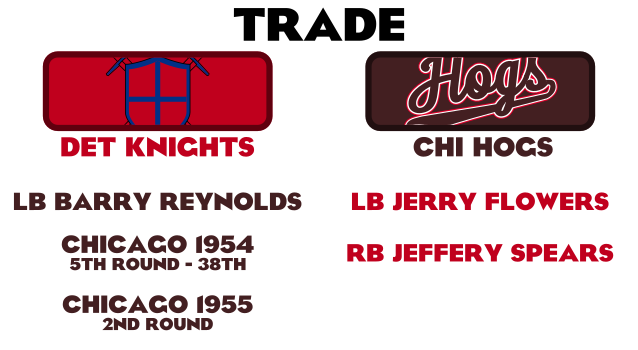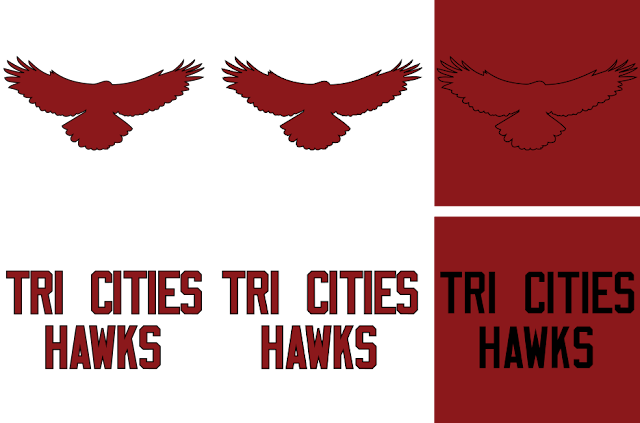1953-54 Offseason
Retirements:
Buffalo QB Don Melton made an impact during his brief two years in the AFL. His first year in the league was his most successful, winning MVP and nearly winning a championship in two leagues before being stopped by the Chicago Hogs. His second season was a massive regression, and the hit he suffered in the East Play-off was enough for him to call it a career after playing 13 years as a pro, winning two championships in the NYPL with the Hammers. OL Cecil Martin also decided to hang up his cleats after 12 years of play between the Detroit Knights and the Tri-Cities Hawks. He won his sole championship in his sophomore season with the Knights in the MWFC, and was one of the top offensive linemen that the league had ever seen. That was enough for Tri-Cities to want him to get back to the championship game, being traded to the Hawks in the infamous “Trade of the Century” that hasn’t seemed to work out for either side just yet. He played two more solid years for the Hawks before letting age get the better of him. The final major player that retired this year was Washington WR Joel Weeks, who retired at 32 finally on top after 11 other seasons of dread. Weeks was the top receiving option while the team was still known as the Buckeyes, and did not see a single winning season during that time. After new management came in and moved the team to D.C., Weeks was relegated to a backup option due to the addition of WR’s Joseph Atkins and Darius Sanderson. Weeks did see some action as the third receiver due to injuries, and did start for the championship game. After over a decade of struggling, Weeks will retire as the franchise’s leading receiver, though Atkins and Sanderson might beat that record if the Federals keep up the pace they are at now.
While not a retirement, the departure of one player did shock the AFL. After coming up short in the championship game, Pittsburgh QB Clarence Stanley’s contract with the Shamrocks was up. Although he had put up two solid seasons in Pittsburgh, he had not brought their first championship home in his two year deal. The Shamrocks were deciding on whether they were to continue with Stanley or move on with the young gun O.J. DeMille, but Stanley made that decision for them. In a shocking move, Stanley signed a massive 5 year contract with the PAFC’s Richmond Patriots to be their starter, the first major player to cross lines between leagues. “I play football to win,” said Stanley in an interview for the Richmond Times-Dispatch, “[Cincinnati and Pittsburgh] didn’t give me the time to win, but the people [in Richmond] believe that I can win.”
Coaching Changes:
After 4 abysmal seasons, the Detroit Knights were not going far with their current coaching lineup. At 78, owner August Riddle finally stepped down from the head coaching position, while also letting go of both OC Lonnie Gibbons and DC Elmer Morton. Cleveland also wanted to go through a minor “reset”, as owner/HC Ike Schwann fired both his coordinators, OC Stephen Harrington and DC Robert Blankenship, to usher in a new era of Crows football. The final firing was surprising, as Tri-Cities fired long-time HC Vincent Merritt after 3 straight losing seasons following their championship in 1950. Hawks owner Bert Hester made the decision to let Merritt go in an attempt to get the team back to the top, which angered many Hawks fans once they heard the news. Hester assured fans that the team would be ready to contend for the championship for 1954 with their new staff.
The Knights made the first move of the coaching carousel, taking the Federals route of luring Chicago OC Leonard Holland to be their head coach. Holland was instrumental in the Hogs’ offensive prowess that exploded last season, and Detroit hopes that he can bring the same tools he utilized in Chicago to the Motor City. Detroit also hired George Wall as their OC, who spent the past few seasons as the WR coach for the Buckeyes/Federals, whose new tandem of Joseph Atkins and Darius Sanderson made him a prime coaching prospect for teams this offseason. Detroit wanted their success to carry over to their receiving core and by extension the rest of their offense with Wall’s arrival. Riddle also managed to lure Michigan University HC Martin Shaw to their open DC position, which was greatly celebrated amongst Knight fans. Shaw’s defensive presence for the Beavers catapulted them from a middle of the pack team in the Central Athletic Conference to a perennial conference title contender within a decade, but the move greatly angered MU fans for seemingly abandoning the team after they reached their peak last year by winning the CAC and the Columbian Bowl. If Michigan alumni are angry at Shaw’s departure, then surely this must mean the Knights’ defensive woes might turn for the better next year.
Chicago didn’t wait long to find their new OC, as it only took a week for the Hogs to name their new coordinator. After an incredibly successful year mentoring RB Billy Gould to a Rookie of the Year award, Chicago owner Donovan Hasenkamp announced that RB coach Johnnie Hendrix would become the team’s new OC. This was somewhat of a surprise for Hogs fans, as Hendrix only had a single year of coaching experience before being promoted to a coordinator. Hendrix had been calling some plays while he was a player for the Hogs, but had never been in an actual coaching role. Many are skeptical of this move, but Chicago hopes that promoting Hendrix can breathe the same life into their offense as he did with Gould.
Vincent Merritt was not out of a job for long, as the Cleveland Crows hired him as their OC. The Crows’ young offensive core needs an experienced coach to lead them, and Merritt’s reputation from the Hawks is more than enough to improve the offensive unit. The Crows joined in on luring away college coaches, as they hired Ohio DC William Wallace to fill the vacant DC slot. Wallace didn’t make the flashiest defense while coaching the Buckeyes, but consistently had successful defenses with a wide variety of players. Cleveland doesn’t have a spectacular defense, but hope that Wallace can bring his magic over from Columbus to improve the Crows’ chance of winning.
Tri-Cities made the least flashy coaching moves, promoting defensive coordinator Hugh Harrison to the head coaching position. Owner Bert Hester sees the potential in Harrison, who has groomed DL Ralph Rogers into arguably the best player in the league. The Hawks’ defense was rather porous last season, but it didn’t stop the Hawks from promoting Harrison after 2 years of being the DC. In his place comes DL coach Calvin Frost, who had been with the team since Rogers’ arrival 5 years ago in the then-named MWFC. Frost had mentored the young Rogers into a star defensive lineman, and Hester promoted Frost to fill the vacant slot left by Harrison. While they did look internally, Tri-Cities’ defense has been suspect the past few years, and it’s anyone’s guess as to how these promotions will do to shake up a stagnant defense centered on the league’s defensive player.
Trades:
The Chicago Hogs narrowly missed out on a championship for QB Alfred Walton, and he has made it known that this season will be his last as a player. Knowing they have one last year to push for another title, they wanted to add experience to their youthful defensive core. They turned to Detroit, who weren’t exactly willing to trade anyone but the Hogs wanted veteran LB Jerry Flowers and gave the Knights a great deal for him. Chicago sent LB Barry Reynolds, their 5th round selection this year, and their 2nd next year for LB Jerry Flowers, and surprisingly RB Jeffery Spears. Spears was not expected to be included in the trade, but the Knights had other plans at the RB position after a few disappointing seasons with Spears as the lead back. Flowers should provide great mentorship as a two-time all-star to the young and mashed together linebacking core.
Now with a crowded running back room, the Hogs had to make a tough decision and move on from RB Brian Bruce, though there weren’t many takers. They could have dealt him to Detroit, but the Knights wanted to retool their team through the draft rather than through trades. That left one single team who wanted a starting running back: Tri-Cities. In addition to Bruce, Chicago sent OL Leonard McGinnis in exchange for the Hawks’ third round selection this year and a 1st rounder next year. McGinnis was never going to crack the starting lineup for the Hogs based on how incredible their front five are, but will have the possibility of starting and providing youth to an aging line. Tri-Cities owner Bert Hester came under scrutiny from fans for giving up another first round selection, having never made one since the draft began 3 years ago. “We already have an amazing group of players at our disposal,” said Hester in an interview for the Davenport Times-Democrat, “there’s no need to get a game-changing player when we already have them on our team.” The Hawks would have had a top-3 pick this year, but traded their first round selection last year to Cincinnati for S Tom Silva.




Comments
Post a Comment